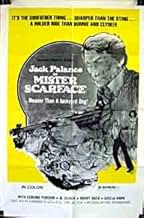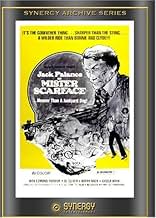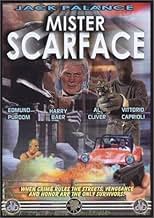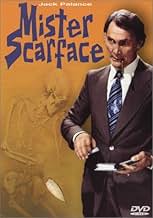VALUTAZIONE IMDb
6,1/10
1230
LA TUA VALUTAZIONE
Aggiungi una trama nella tua linguaTwo small-time hoodlums plot to get even with a treacherous boss who is intent on monopolizing all criminal activity within Rome.Two small-time hoodlums plot to get even with a treacherous boss who is intent on monopolizing all criminal activity within Rome.Two small-time hoodlums plot to get even with a treacherous boss who is intent on monopolizing all criminal activity within Rome.
Carmelo Reale
- Luca
- (as Roberto Reale)
Raul Lovecchio
- Manzari Goon
- (as Raul Lo Vecchio)
Erigo Palombini
- Manzari Goon
- (as Enrico Palombini)
Recensioni in evidenza
Fernando Di Leo's 1974 'Rulers of the City' is a delightful find among the gems of Italian cinema. The film is fast paced. It is, in hindsight, a gentle send up of the gangster genre. Remember took his treatment of spaghetti westerns to the urban turf, and, under all the grime and grit, he brings a comic turn. The cast is international: Harry Baer (Tony)is German; Jack Palance (Mr. Scarface)American; Al Cliver a Cairo-born Italian; and Vittorio Caprioli (Napoli) Italian. All things considered, it should come as no surprise that a German should appear in an Italian film. Remember, Visconti's casting of Alain Delon and his lover Helmut Schmidt. Italy was a haven for Americans: Italian directors brought out the hidden talent of some actors rarely seen in America. Richard Basehart in Fellini's 'la Strada'or Clint Eastwood who found an exit from a dead-end career in the US in Leone's spaghetti westerns as did Lee Van Clef. De Leo used well the image of Palance's face which incarnates the evil of loan sharks, and within he got an actor who could speak Italian. Baer brings the youthful elan of wanting to make it big and quick as a 'tax collector' though his fists and his intelligence. Cliver with a face of a fallen angel seeks revenge with a natural quickness and understanding of a finely tuned intelligence. And of course in Caprioli, he well used a finely turned the finely tuned sense of comedy and the wiliness of an old fox. The film opens up with a dreamlike sequence that as the quickly paced story is the key to its denouement. There is only one thing for you to do: rush out, find a copy of 'Rulers of the City', sit back and enjoy it!
What went wrong here? Fernando Di Leo drops the ball in a meandering crime film that takes almost fifty minutes to get anywhere and doesn't feature any particularly interesting characters. All Jack Palance does is scowl with a cigarette in his mouth, something you've seen him do in a dozen other films.
It starts out with a kid witnessing his father being killed by Jack Palance, then we fast forward to the present (seventies Rome), where Tony works for local mob guy Luigi (played by a very pale Edmund Purdom). Tony wants to work the big leagues and ends up teaming up with Al Cliver, a guy who until recently worked for Palance. I guess the mystery is figuring out which one of them was the kid at the start of the film.
The first two thirds of the film concentrate on these two scamming Palance while also fighting with Purdom's second in command, and the main problem is neither of the leads are that interesting. The only character with any depth is the old Neopolitan pickpocket who gets caught up in the all the madness. For some reason though his character has an over the top Italian accent whilst everyone else is dubbed American.
Most of the action takes place in the last half hour of the film, where finally everyone gets their guns out. This is where Al Cliver shines as he's not the best at being emotional, but at least he looks cool gunning people down. The whole film seems a bit tired and it's as if Di Leo didn't know where to take the story, and as there's about a million Eurocrime films from 1976, this one doesn't quite cut it.
It starts out with a kid witnessing his father being killed by Jack Palance, then we fast forward to the present (seventies Rome), where Tony works for local mob guy Luigi (played by a very pale Edmund Purdom). Tony wants to work the big leagues and ends up teaming up with Al Cliver, a guy who until recently worked for Palance. I guess the mystery is figuring out which one of them was the kid at the start of the film.
The first two thirds of the film concentrate on these two scamming Palance while also fighting with Purdom's second in command, and the main problem is neither of the leads are that interesting. The only character with any depth is the old Neopolitan pickpocket who gets caught up in the all the madness. For some reason though his character has an over the top Italian accent whilst everyone else is dubbed American.
Most of the action takes place in the last half hour of the film, where finally everyone gets their guns out. This is where Al Cliver shines as he's not the best at being emotional, but at least he looks cool gunning people down. The whole film seems a bit tired and it's as if Di Leo didn't know where to take the story, and as there's about a million Eurocrime films from 1976, this one doesn't quite cut it.
I had first watched this on the big screen as part of the Italian B-movie retrospective held during the 2004 Venice Film Festival (where 6 features by Di Leo were shown); back then, I didn't like it - rating it ** and feeling that it was rather unbalanced by the vulgar comedy relief (though typical of Italian films during this era), especially when compared to the director's other relatively more sober stuff (which had proved my first encounter with his work)!
Watching it again as part of a mini-tribute to its star, Jack Palance (who passed away recently), I found myself a lot more receptive to it; Di Leo dabbled most often in the crime genre and, as can be deduced from the title, this one falls into that category: the plot, dealing with a gang war (one faction controlled by Palance and the other by Edmund Purdom), is no great shakes but, at its centre is a revenge plan involving Palance and young misfit Al Cliver (whose identity is unknown to the 'boss'); this element gives it an undeniable edge, and the exciting climax takes place at a massive abandoned slaughterhouse - where an old betrayal and murder had taken place.
As is typical of the director, the action is pretty constant and always dynamic - aided by a fine eclectic score by Luis Enrique Bacalov; there's a discreet amount of nudity and, as I said, a slight overdose of comedy: however, as I watched more films by Di Leo (totaling nine so far), I realized that this was basically an idiosyncrasy of his (evident even in a straight melodrama such as LA SEDUZIONE [1973]) but, in any case, I generally appreciated its style of humor now - especially when delivered by Di Leo regular Vittorio Caprioli (my favorite bit occurs towards the end, when he shoots the bad guys at close range with a bunch of guns he purchased for an eventual showdown but, constantly missing the mark, reasons to himself that the weapons must be defective and, therefore, he ought to return them and file a complaint to boot!).
Palance is suitably sinister and imposing - even if he probably spends more time being had, so to speak, than dishing it out! In the end, what's missing from the film vis-a'-vis Di Leo's other genre work is a strong hero (i.e. a credible opponent to Palance) in the vein of Gastone Moschin (from THE CONTRACT [1972]), Mario Adorf (from THE Italian CONNECTION [1972]) and Henry Silva (from WIPEOUT! [1973])...
Watching it again as part of a mini-tribute to its star, Jack Palance (who passed away recently), I found myself a lot more receptive to it; Di Leo dabbled most often in the crime genre and, as can be deduced from the title, this one falls into that category: the plot, dealing with a gang war (one faction controlled by Palance and the other by Edmund Purdom), is no great shakes but, at its centre is a revenge plan involving Palance and young misfit Al Cliver (whose identity is unknown to the 'boss'); this element gives it an undeniable edge, and the exciting climax takes place at a massive abandoned slaughterhouse - where an old betrayal and murder had taken place.
As is typical of the director, the action is pretty constant and always dynamic - aided by a fine eclectic score by Luis Enrique Bacalov; there's a discreet amount of nudity and, as I said, a slight overdose of comedy: however, as I watched more films by Di Leo (totaling nine so far), I realized that this was basically an idiosyncrasy of his (evident even in a straight melodrama such as LA SEDUZIONE [1973]) but, in any case, I generally appreciated its style of humor now - especially when delivered by Di Leo regular Vittorio Caprioli (my favorite bit occurs towards the end, when he shoots the bad guys at close range with a bunch of guns he purchased for an eventual showdown but, constantly missing the mark, reasons to himself that the weapons must be defective and, therefore, he ought to return them and file a complaint to boot!).
Palance is suitably sinister and imposing - even if he probably spends more time being had, so to speak, than dishing it out! In the end, what's missing from the film vis-a'-vis Di Leo's other genre work is a strong hero (i.e. a credible opponent to Palance) in the vein of Gastone Moschin (from THE CONTRACT [1972]), Mario Adorf (from THE Italian CONNECTION [1972]) and Henry Silva (from WIPEOUT! [1973])...
Writer/director Fernando Di Leo chronologically made three of the most stupendously amazing "Poliziottesco" (hardcore Italian cop/gangster thrillers) milestones with "Milano Caliber .9", "La Mala Ordina" and "Il Boss". I respectively granted those films with rating 10/10, 9/10 and 9/10
just to indicate how powerful and overwhelming they are. Di Leo honestly was a brilliant but sadly underrated director who really knew how to make hardcore-to-the bone action movies. There are no good or loyal characters in Fernando Di Leo's depiction of the Italian mafia
There are only vicious and emotionless gangsters that would butcher their own parents in order to climb one small step up the ladder of power & influence. Although nearly not as brilliant as the aforementioned trio, Di Leo's later films keep featuring the same story elements. "Rulers of the City" – the literally translated title which I vastly prefer over "Mister Scarface" – is another mafia flick full of ultra-sadistic characters, nasty double-crossings, merciless executions, brutal bare-knuckle fistfights and explosive vendettas.
Tony is a smooth and handsome but insignificant guy who works as a debt collector for Luigi Cherico; the number #2 gangster boss of Naples. He wants to make an impression on his boss and ingeniously plunders 10 million Lire from the absolute biggest crime lord in town, the feared and relentless Scarface. Tony unwillingly evokes a mafia war in Naples and finds himself in between the two camps. Luckily he receives help from an elderly Mafiosi and a mysterious blond shooting expert with an old personal vengeance to settle. "Rulers of the City" has a well- written and fast-paced script, and all the fistfight battles and shootout sequences are exhilarating and brute. The film also benefices from neat camera-work and a terrific score provided by Di Leo's regular composer Luis Bacalov. Still, "Rulers of the City" suffers from two serious defaults that simply cannot be neglected. First of all, everything is done to make it seems like the entire film orbits around Jack Palance and his character Mr. Scarface, but his role honestly isn't that extended or fundamental. The DVD-cover image that I own illustrates Jack Palance looking bewildered and firing off a machine gun, but never at one point during this movie he takes the effort of even picking up a weapon. Secondly, what's with the homo-erotic undertones in this film? It isn't too abnormal that there generally aren't many female lead roles in Italian gangster movies, but this one exaggerates! The only women in this film are secretaries, prostitutes and walking eye-candy on the sidewalk. Furthermore the hints at homosexuality are downright bizarre and misplaced. The older Mafiosi Vincenzo Napoli is obviously gay, with his pink scarves and feminine gestures the entire time, but even the two lead actors could easily pass for a cute couple. Whenever they're driving around the city in Tony's flamboyant buggy, they look like an advertisement campaign for coming out of the closet and the only thing missing is a slogan on the bottom of the screen saying "it's okay to be gay".
Tony is a smooth and handsome but insignificant guy who works as a debt collector for Luigi Cherico; the number #2 gangster boss of Naples. He wants to make an impression on his boss and ingeniously plunders 10 million Lire from the absolute biggest crime lord in town, the feared and relentless Scarface. Tony unwillingly evokes a mafia war in Naples and finds himself in between the two camps. Luckily he receives help from an elderly Mafiosi and a mysterious blond shooting expert with an old personal vengeance to settle. "Rulers of the City" has a well- written and fast-paced script, and all the fistfight battles and shootout sequences are exhilarating and brute. The film also benefices from neat camera-work and a terrific score provided by Di Leo's regular composer Luis Bacalov. Still, "Rulers of the City" suffers from two serious defaults that simply cannot be neglected. First of all, everything is done to make it seems like the entire film orbits around Jack Palance and his character Mr. Scarface, but his role honestly isn't that extended or fundamental. The DVD-cover image that I own illustrates Jack Palance looking bewildered and firing off a machine gun, but never at one point during this movie he takes the effort of even picking up a weapon. Secondly, what's with the homo-erotic undertones in this film? It isn't too abnormal that there generally aren't many female lead roles in Italian gangster movies, but this one exaggerates! The only women in this film are secretaries, prostitutes and walking eye-candy on the sidewalk. Furthermore the hints at homosexuality are downright bizarre and misplaced. The older Mafiosi Vincenzo Napoli is obviously gay, with his pink scarves and feminine gestures the entire time, but even the two lead actors could easily pass for a cute couple. Whenever they're driving around the city in Tony's flamboyant buggy, they look like an advertisement campaign for coming out of the closet and the only thing missing is a slogan on the bottom of the screen saying "it's okay to be gay".
Rulers of the City does have a lot going for it. It does fall short of being great, and Fernando Di Leo and Jack Palance have done better in their respective careers, but this is not even close to being career-worsts for either and is a very respectable film overall.
The locations are splendid, and the gritty roughness of the photography and clever (without being too much or too dizzying) camera angles capture it more than ideally. There is also a dynamite score, exhilarating action scenes (the final shootout being the prime example) and mostly above-decent direction, if in need of more tension in places. The script is tight and more light-hearted than Di Leo's Milieu trilogy, but it was light-heartedness and witty humour that didn't feel too misplaced, and the story is at least engrossing and swiftly paced on the most part.
Casting-wise, Rulers of the City is very much a mixed bag, with the best performances being from a sinister Jack Palance (though he was deserving of more screen time) and a lively and lots-of-fun, without being too clownish, Vittorio Napoli as the film's most colourful character. Harry Baer has some charming moments too and Giselda Hahn brings a little heart. Al Clivar however does show his limitations as an actor in a somewhat one-note performance and Edmund Perdum is rather stiff in an underwritten role.
Aside from a slow-motion dream-like opening sequence, that was quite striking if perhaps not necessary, Rulers of the City does take too long to get going and the story only really comes to life once Palance appears. The film was in need of more tension and suspense, and stronger writing for the villains (who were underutilised and never really developed, and this is including Palance's character) would have helped. The final shoot-out is great, but ends a little anti-climactically. And I do have to agree about the homo-erotic undertones and homosexuality hints being clumsily written and out of place, which did feel the film a bizarre feel at times.
Overall, respectable but could have been better. 6/10 Bethany Cox
The locations are splendid, and the gritty roughness of the photography and clever (without being too much or too dizzying) camera angles capture it more than ideally. There is also a dynamite score, exhilarating action scenes (the final shootout being the prime example) and mostly above-decent direction, if in need of more tension in places. The script is tight and more light-hearted than Di Leo's Milieu trilogy, but it was light-heartedness and witty humour that didn't feel too misplaced, and the story is at least engrossing and swiftly paced on the most part.
Casting-wise, Rulers of the City is very much a mixed bag, with the best performances being from a sinister Jack Palance (though he was deserving of more screen time) and a lively and lots-of-fun, without being too clownish, Vittorio Napoli as the film's most colourful character. Harry Baer has some charming moments too and Giselda Hahn brings a little heart. Al Clivar however does show his limitations as an actor in a somewhat one-note performance and Edmund Perdum is rather stiff in an underwritten role.
Aside from a slow-motion dream-like opening sequence, that was quite striking if perhaps not necessary, Rulers of the City does take too long to get going and the story only really comes to life once Palance appears. The film was in need of more tension and suspense, and stronger writing for the villains (who were underutilised and never really developed, and this is including Palance's character) would have helped. The final shoot-out is great, but ends a little anti-climactically. And I do have to agree about the homo-erotic undertones and homosexuality hints being clumsily written and out of place, which did feel the film a bizarre feel at times.
Overall, respectable but could have been better. 6/10 Bethany Cox
Lo sapevi?
- QuizIntroductory line to the title character's introductory scene, upon Scarface's entry into the club: That's "The" Scarface. He's bad news, I can tell you. Just looking at him and my asshole twitches.
- BlooperIn the final chase scene, the passenger fires a gun through the windshield, at the motorcycle they are chasing. The window is not shattered after many shots fired through it.
- Citazioni
Vincenzo Napoli: [upon Scarface's entry into the club] That's "The" Scarface. He's bad news, I can tell you. Just looking at him and my asshole twitches.
- Versioni alternativeGerman VHS version was cut by ca. 8 minutes.
- ConnessioniFeatured in Italian Gangsters (2015)
I più visti
Accedi per valutare e creare un elenco di titoli salvati per ottenere consigli personalizzati
- How long is Rulers of the City?Powered by Alexa
Dettagli
- Tempo di esecuzione
- 1h 28min(88 min)
- Proporzioni
- 1.85 : 1
Contribuisci a questa pagina
Suggerisci una modifica o aggiungi i contenuti mancanti






























